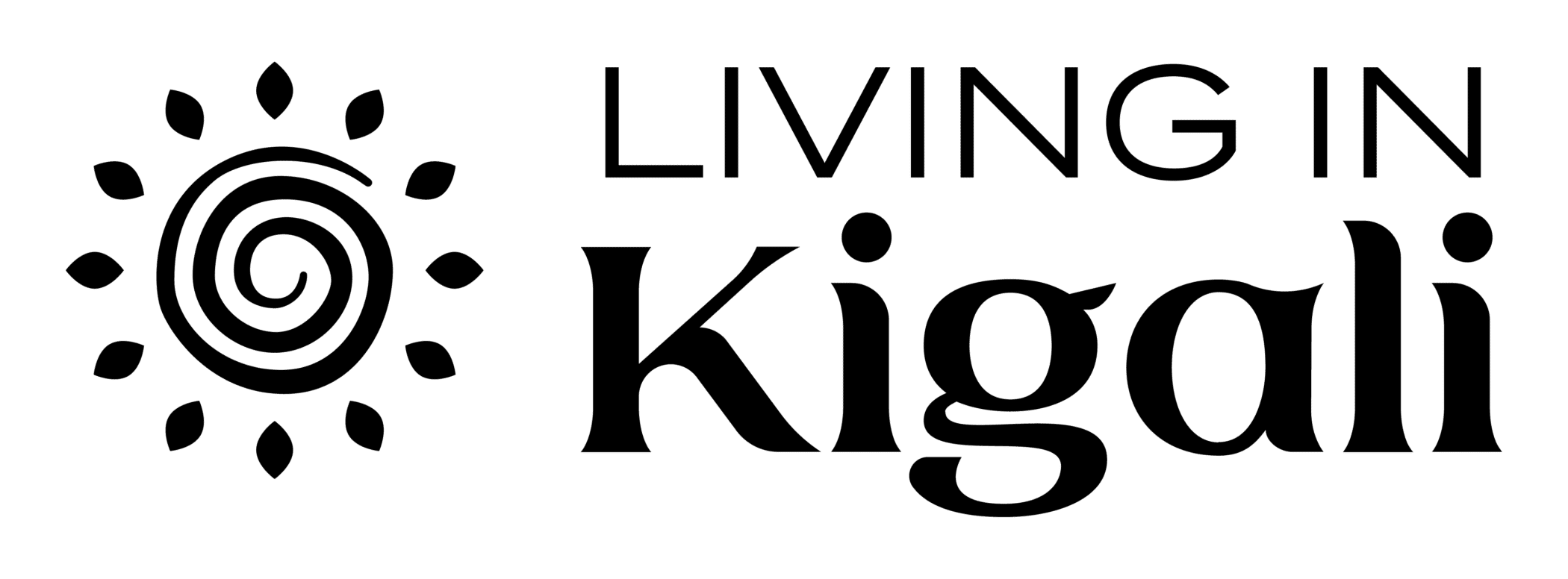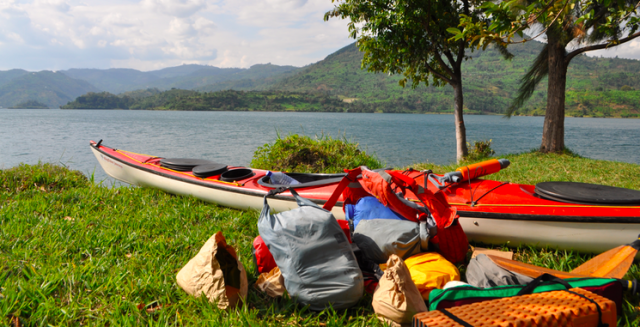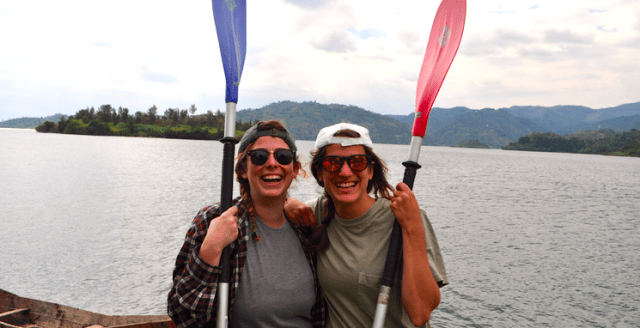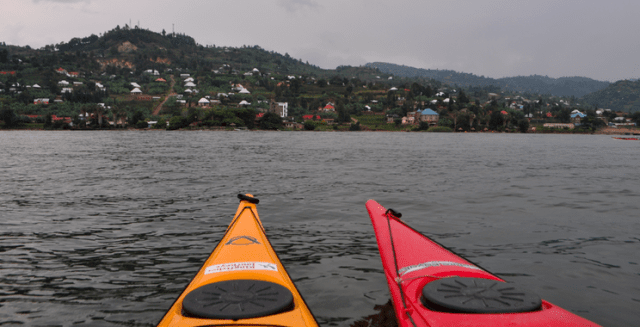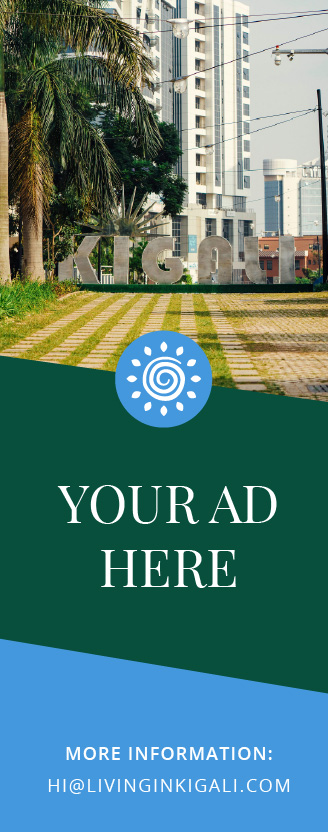I’ve been on countless road trips throughout Rwanda – from the eastern provinces to Nyungwe National Park to the volcanoes of Musanze, and they’re all stunning. Rwanda, as we can agree, is a beautiful country. However, not to make this a competition or anything, but while Rwanda by land is wonderful, Rwanda by water is truly spectacular. I recently spent four days kayaking from Kibuye to Gisenyi with Kingfisher Journeys and loved it! Keep on reading below for all the down and dirty details on our itinerary, from the lack of showers (the best!) to the kayaking conditions to the transportation and accommodation specifics.
The Basics
This four day trip ranges in price (depending on if you’re a resident, student, volunteer, or regular tourist) from $180 to $300, and is very good value for an entire half a week on the water. Keep in mind that accommodation and food are not included after the first camping night. The price covers the kayaks, your camping equipment, water, and your fantastic guide. You have a few options where to stay along the way, and read on for your options!
Don’t expect luxury – you will be camping at least one night, and spending the rest of the nights in small guesthouses. Though you cannot shower at the camping island, depending on the accommodations you choose along the way you might be able to snag a shower during the week (don’t expect hot water, however). The food options are good and taste amazing after a day on the water, but you’re not going to be eating the most gourmet meals of your life.
You don’t have to be in great shape to do this trip (ahem, looking at myself here), but you have to be at least moderately fit and ought to have kayaked a few times previously. You will really only be kayaking up to 4 or 5 hours a day depending on the fitness levels of your group, but we took tons of breaks and lazed about checking out the beautiful scenery all the time. Don’t be nervous! The Kingfisher team is awesome and will absolutely be looking out for you before, after, and during your trip.
What to Bring
So this is a kayaking trip and you’re going to spending most of your days on the water. You’re going to get pretty wet, and the clothes you bring should reflect that. Quick dry items are preferable, and I ended up wearing the same quick dry leggings and tank top for several days (yes, I’m gross). You can rent camping equipment (sleeping bag, tent, and sleeping pad) from Kingfisher, or you could bring your own like we did. A couple of other things to make sure are on your list:
- Sunscreen (bring SO much of this – it’s hot out there)
- A change of clothes for when you finish kayaking for the day that are dry.
- Hammocks (who doesn’t love a good hammock), playing cards, books, and other things to entertain yourself for the non-kayaking portion of your days.
- A sweater or fleece for when the nights get chilly.
- Cameras! Gotta document those amazing landscapes!
- Kingfisher provides drybags (to seal up valuables), but if you have more feel free to bring those too.
- SNACKS! We had lots of nuts, dried fruit, chocolate, and other goodies with us, and that was so helpful.
Getting to Kibuye and where to stay:
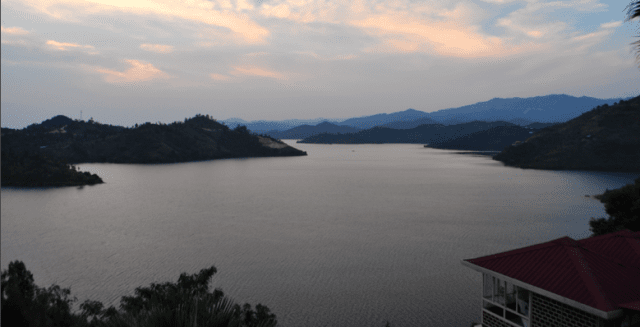
Though our kayaking journey started on a Wednesday, Jenny and I were asked to get to Kibuye on Tuesday to make sure everything was sorted and ready to go for our 8am departure the next day. That Tuesday afternoon we met up with Francis, our awesome Kingfisher guide, to make sure all our gear fit into the kayaks and chat about the schedule for the coming days.
We also arrived early in an attempt to transfer some luggage from Kibuye to Gisenyi that we did not want to take on the kayaks. Kingfisher had offered to help us out, and had asked the boat driver who had transferred the Kingfisher kayaks to Kibuye from Gisenyi to transfer our items back to Gisenyi. This proved to be pretty confusing, and I would probably recommend not trying to do this in the future because of the uncertainty. Regardless, with the help of Francis, we were able to pay the boat driver Rwf 10,000 to transfer our belongings as he was already going to be making his way back to Gisenyi.
To get to Kibuye from Kigali, you can either self-drive or take a three hour long bus ride from Nyabugogo. I usually use the Capital bus company, where tickets are Rwf 2,500 per person and the drivers are not outrageously fast.
Once in Kibuye, we spent the night at one of my favorite spots in town, Home Saint Jean. Ah, Home Saint Jean… home to cheap rooms (doubles start at Rwf 18,000 for the whole room, and dorms at Rwf 8,000 per person), great views, and cold beer (Rwf 1,400 for a large Skol Lager). The view from the restaurant is special. Just really really special. Trust me, if you’re on a budget this is definitely the place to be. Service, while sometimes slow, is generally pretty good. Though the menu has some hit and misses, the grilled half chicken with chips (Rwf 6,000) is big enough for two and is easily one of my favorite meals along Lake Kivu. After dinner, we went to bed quite early to be all ready for the adventures to come. Get at us, Lake Kivu!
Day One
We started our journey at the Bethany hotel at 7:30am. After packing up the kayaks, our little group of five (Francis, Jenny, a couple, and myself) hit the water. Though the water was very calm in the beginning, about an hour into our trip the wind started tossing our little kayaks around. Jenny and I have kayaked quite a bit before, so were fine when it got a little choppy, but the two other people in our group were not the happiest. So here is Pro tip #1: do not come on this trip unless you want to kayak for 4 days and feel comfortable on the water! The other couple ended up leaving the trip permanently by midday, which was a bummer. Yikes. We had a blast though! And after they were picked up by a boat to take them directly to Gisenyi, we kayaked the islands of Kibuye (and even saw the famous swimming cows). After a few hours, we made our way to our lovely uninhabited island to set up camp for the night.
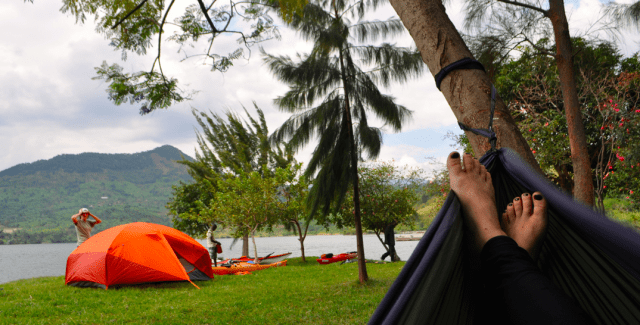
The island is beautiful, with stunning views out onto the lake for sunset and perfectly placed trees from which to hang hammocks. Pro tip #2: bring a hammock! Additionally, as I realized while unpacking gear for the night, make sure that you keep everything you store in the kayaks in dry bags. While the spots where you store items in the kayak shouldn’t theoretically get wet, I learned my lesson after spending the first night on a slightly damp sleeping mat and bag that I hadn’t protected well enough. So pro tip #3: use those dry bags, friends!
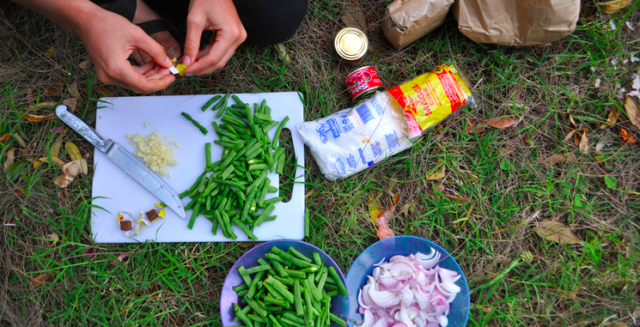
Dinner that night was delicious, and we cooked potatoes, eggs, and vegetables with Francis. Though fish is a possibility at the island, it’s not a guarantee if the water that day was a little rough and fishermen did not venture out. As a result, I would recommend asking Francis or whoever your guide is to make sure you have eggs or some other protein in addition to your vegetables – you’re getting a work out, and (pro tip #4) need that protein!
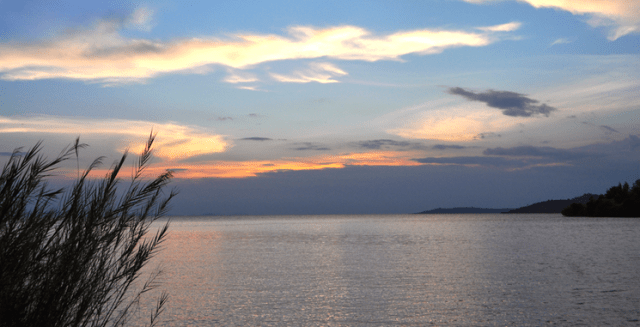
After a filling meal and a somewhat intense day on the water (those waves are no joke!), we fell asleep around 8:00pm with plans to wake up early the next morning.
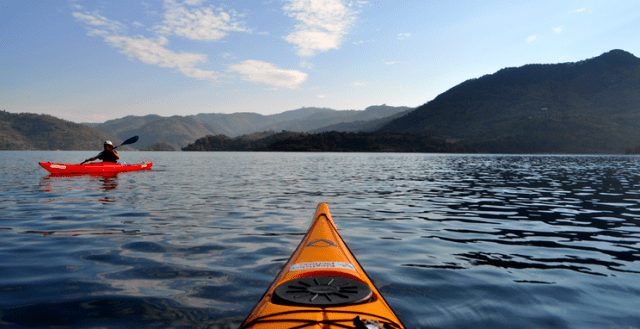
Day Two
This was likely our favorite kayaking day of the trip because dang – Lake Kivu is stunning. Especially early in the morning. The views are beautiful, the water was calm, and the blue and green hills in the background were mesmerizing. As we had learned the day before, June and July are (apparently) windy season on the lake. Francis recommended we leave the campsite on the earlier side around 7:00 or 7:30am, and after doing that for the rest of the week, we had very few issues with wind. In fact, the lake was positively serene and the reflections on the water were unbelievable.
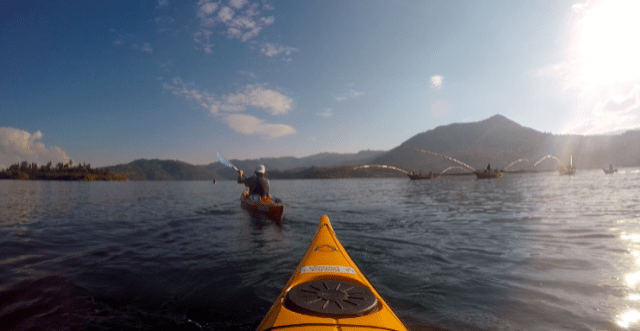
We started off our morning from the island watching as several fishing boats came into the nearby town. I had seen these boats in the distance in the past, but this was the closest I had seen them in person – and they’re the coolest!
Though you’re generally kayaking only about ten kilometers a day, on Day 2 from Kibuye you can do an additional six kilometer kayak around Bugarura island if you want. This island is the biggest one on Lake Kivu, and the kayak around the island is pretty scenic (although long).
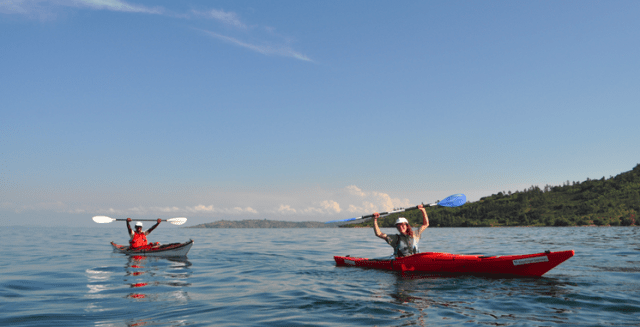
After a couple good hours on the lake, we arrived at Kinunu. There are two options for sleeping arrangements on Day 2, and you can choose between the budget Kinunu Guesthouse or the Rushel Kivu Lodge. The Kinunu Guesthouse is a nice, cheaper option (and is where we stayed). Camping in their yard runs Rwf 10,000 per tent, and doubles are Rwf 25,000 (this option includes breakfast). You can order a buffet dinner at Kinunu Guesthouse for Rwf 5,000 per person, and they have cold sodas and beer on sale as well.
Alternatively, the Rushel Kivu Lodge is a bit more expensive. Though camping with your own tent is the same price as at Kinunu (Rwf 10,000 per tent), the next cheapest option for a double (either in their glamping tents or the actual rooms) is Rwf 35,000 for two people. That being said, the food is quite good (with fish, chicken, beef brochettes running between Rwf 1,000 and 1,500), and you can order off a menu as opposed to doing a buffet. We came here for lunch after finishing kayaking for the day, and had a really enjoyable time hanging out and enjoying the view at the lodge.
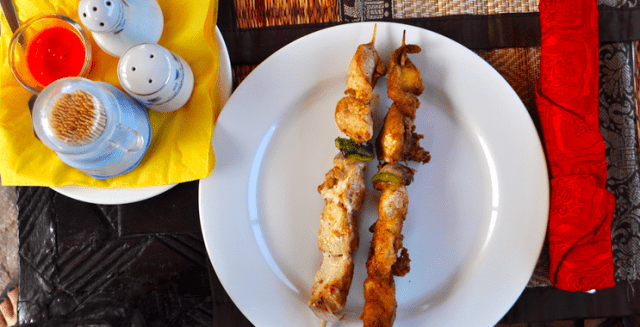
In retrospect, I probably would have stayed at Rushel Kivu Lodge and camped with the tent we brought due to the good food options, nice beach, and beautiful view. Additionally, with Rushel Kivu Lodge you just kayak up the shore onto the beach, whereas with Kinunu Guesthouse you have to hike up a little bit and Francis enlists some folks to help carry the kayaks. However, if you’d really rather stay in a room and not a tent, are strapped for cash, and don’t care about the view or the food, Kinunu Guesthouse is probably the way to go.
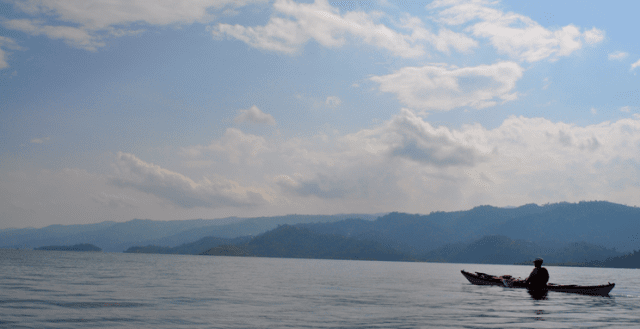
Day Three
This was another beautiful kayaking day, but it is also your hump day. By that I mean, if you’re like me and rarely work out, your body is going to be feeling it. My arms felt like noodles. Oops. Might be time to start hitting the gym. Francis, however, was a champ and kept motivating us, specifically by feeding us bananas every few kilometers. It was delightful.
Though Francis provided the bananas for the day, Jenny and I provided the entertainment. This leads me to Pro tip #5: go with people you want to hang out with! We spent our time singing absurd camp songs I learned in the middle of Maine, playing cards, reading Harry Potter to each other, and just generally talking nonsense. It was great. Get a good fun group together, and you’ll have an awesome time regardless of the conditions.
Our 10 kilometer paddle for the day was fairly uneventful – albeit beautiful, and we had the chance to really see a lot of bird life. Watching cormorants dip in and out of the water looking for fish is really cool, while taking our time kayaking towards Gisenyi was truly enjoyable.
After getting to the guesthouse in Cymbili, we set up the hammock, hung out, called our families, and just generally relaxed. This guesthouse is probably my favorite place we stayed at, though the island camping is also great. It is Rwf 15,000 for a double room or Rwf 5,000 per person if you’re camping, so we snagged a double room as the prices were so similar. It was Rwf 5,000 per person for a simple buffet dinner, and the staff there were really kind, thoughtful, and relaxed. In fact the whole place was relaxed, and the sunset views were wonderful. When the afternoon wind died down a little bit, Francis set up a little fire and we roasted some marshmallows to make s’mores as a little pre-dinner snack. Pro tip #6: bring marshmallows!
The guesthouse sits on a nice sandy beach, so if it’s not too windy you can enjoy a nice beach day post-kayaking. The beach is also fantastic because you literally can paddle onto shore and be just a few meters away from the guesthouse. And trust me – by day three you’re going to appreciate that.
Day Four
Ah, day 4. Our last day! I still can’t believe our trip was over so quickly. We woke up in the morning morning at 5:30am to the chorus of songs from the nearby boarding school. As delightful as that sentence sounds theoretically, it made me want to jump into the lake. So! Keep that in mind – if you’re here on a weekend, you’ll likely be woken up. About an hour later, we rolled out of bed and got ready to kayak the last leg of this journey to Gisenyi.
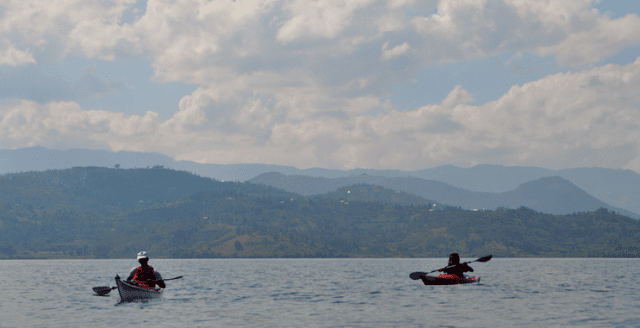
Though the first hour or so of the day was the usual blue waters of Kivu, right before we made it to Gisenyi we passed a lot of trash in the water that Francis explained was floating from the Congo side of Lake Kivu. We were all pretty shocked to see the mass amounts of trash, especially as a toilet-seat floated right by (you just can’t make this stuff up). Whoops. Anyways, we weren’t sure if it was a shift in the wind or a week of a lot of garbage, but it was pretty wild. Other than that, it was another stunning day on the water! Kayaking into Gisenyi, with views of Goma fairly clear, was a great end to a great trip.
We landed at Paradise Malahide around 11am (since we are obviously expert kayakers at this point) ready to shower, but definitely bummed to leave our little kayaks and wonderful Francis behind! The paddle to Gisenyi feels a little long, perhaps longer than 10 kilometers, but that could also be because our arms felt like overcooked spaghetti at this point. A Fanta citron and a cold Skol later (in addition to gallons of water – stay hydrated, kids!) we were already reminiscing about our time on Lake Kivu and with Kingfisher.
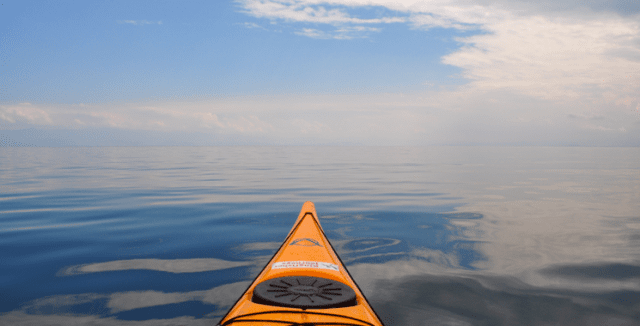
Final Thoughts
I would absolutely do this again! Or perhaps attempt the Kibuye to Cyangugu trip and truly finish up the Congo Nile Trail by water. I’ve spent a good few years going on hikes and different trips around Rwanda, and our time with Kingfisher Journey was definitely unique. Whether you live here or are a tourist, this trip is a lovely way to see the country from a new perspective. Thanks for an awesome time, Kingfisher Journeys! Any questions about our trip? Want to go soon? Let us know in the comments!
To book or for more information, check the Kingfisher Journeys website, Facebook page, email them at [email protected], or call +250 (0)783 811 918 in Rwanda or you can reach them in the UK at +44 (0)33 0001 0610.
